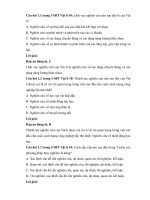CHAPTER 1 MORPHEMES
Bạn đang xem bản rút gọn của tài liệu. Xem và tải ngay bản đầy đủ của tài liệu tại đây (252.97 KB, 18 trang )
TON DUC THANG UNIVERSITY
Faculty of Foreign Languages
MORPHOLOGY - 001167
Chapter 1: MORPHEMES
Designed by Lam Quang Tuyet Minh
12/02/22
001167 – Chapter 1
1
CHAPTER 1
1.1 Introduction
1.2 Definition of Morphemes
1.3 Free and Bound Morphemes
1.4 Bases
1.5 Affixes
1.6 Inflectional Affixes
1.7 Derivational Affixes
1.8 Suffixal Homophones
1.9 Noun Feminine Forms
1.10 Noun Diminutive Forms
12/02/22
001167 – Chapter 1
2
1.2 DEFINITION
Morphology: The study of processes according to which
morphemes combine to form words
[Stageberg, 2000:83]
12/02/22
001167 – Chapter 1
3
1.2 DEFINITION
Morphemes: the smallest meaningful unit in a
language. [Richards, Platt & Weber (1987)]
Morphemes: the smallest individually meaningful
elements in the utterances of a language. [Charles
Hockett (1958)]
e.g. teacher = {teach} + {-er}
students = {student} + {-s}
12/02/22
001167 – Chapter 1
4
1.3 FREE and BOUND MORPHEMES
Morphemes: Free and Bound
A free morpheme: the one that can be uttered alone
with meaning. [Stageberg, 1983: 85]
e.g. eat, certain, house, happy…
A bound morphemes: may occur only when they
combine with another morpheme. [Jackson, 1980:
53]
e.g. inter-, -vene, -er, -ly…
12/02/22
001167 – Chapter 1
5
1.4 BASES
Morphemes: Bases and Affixes
A base: part of words that has the principal
meaning.
e.g. loveable, annoyance, re-enter, denial,
audience
12/02/22
001167 – Chapter 1
6
1.4 BASES
Free bases: can stand alone as a word when the
attached morphemes are removed.
e.g. unbreakable; friendship
Bound bases: never occur on its own and can be
joined to other bound morphemes.
e.g. sentiment, occur, monogamy
12/02/22
001167 – Chapter 1
7
1.5 AFFIXES
An affix:
a bound morpheme occurring
before, within, or after a base
PREFIX
unhappy, independent,
discovery
12/02/22
INFIX
geese, men, wrote
001167 – Chapter 1
AFFIX
happily, actor, loneliness
8
1.6 INFLECTIONAL AFFIXES
The schema of the Inflectional affixes:
1. {-s pl}:
dogs, oxen, mice
2. {-s sg ps}:
boy’s, girl’s
3. {-s pl ps}:
boys’, girls’
4. {-s 3d}:
vacates, walks
5. {-ING vb}:
discussing
6. {-D pt}:
chewed, rode
7. {-ER cp}:
bolder, nearer
8. {-EST sp}:
boldest, nearest
12/02/22
001167 – Chapter 1
9
1.6 INFLECTIONAL AFFIXES
The characteristics:
- Do not change the part of speech
- Come last in a word
- Go with all stems
- Do not pile up
12/02/22
001167 – Chapter 1
10
1.7 DERIVATIONAL AFFIXES
Derivational affixes can change the meaning or the
word class of the words/ bases which they are added
to.
e.g. unhappy, inconvenient, adornment, failure,
lecturer
12/02/22
001167 – Chapter 1
11
1.8 SUFFIXAL HOMOPHONES
Some suffixes, inflectional and derivational,
have homophonous forms.
{-ER}
{-ER cp}
bigger, fatter, smaller
12/02/22
{-ER n}
teacher, worker, fisher
001167 – Chapter 1
{-ER rp}
chatter, mutter, patter
12
1.8 SUFFIXAL HOMOPHONES
Homophonous forms:
{-ING}
{-ING vb}
sleeping, burning,
talking
12/02/22
{-ING nm}
meeting, painting,
wedding
001167 – Chapter 1
{-ING aj}
charming, exciting,
interesting
13
1.8 SUFFIXAL HOMOPHONES
Homophonous forms:
{-D}
{-D aj}
{-D pp}
excited, devoted, interested
chosen, given, finished
12/02/22
001167 – Chapter 1
14
1.8 SUFFIXAL HOMOPHONES
Homophonous forms:
Homophonous
forms:
{-ly}
{-ly av}
{-ly aj}
kindly, formally, happily
friendly, manly, lovely
12/02/22
001167 – Chapter 1
15
1.9 NOUN FEMININE FORMS
English has a small number of nouns with
feminine derivational suffixes.
SUFFIX
12/02/22
MASCULINE
FEMININE
-e
fiancé
fiancée
-ette
farmer
farmerette
-ine
hero
heroine
-ess
tiger
tigress
001167 – Chapter 1
16
1.10 NOUN DIMINUTIVE FORMS
The morphemes convey a meaning of smallest or
endearment or both.
1. –ie, -i, -y
auntie, Willy
2. –ette
dinette, towelette
3. –kin, -ikin, --kins
lambkin, manikin
4. –ling
duckling, darling
5. –et
circlet
6. –let
booklet, starlet
12/02/22
001167 – Chapter 1
17
HOMEWORK
Do the exercises in:
• [2]: 16-26, 28-43, 44-58
• [3]: 9, 87-113
• [4]: 1-27, 157-189
• [5]: 62-72
12/02/22
001167 – Chapter 1
18

